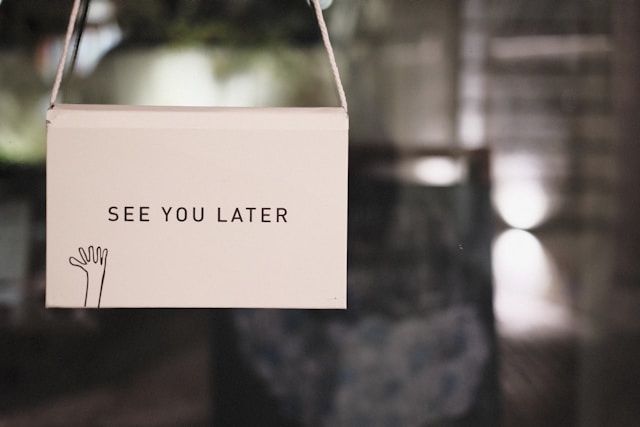Written by: Milica Bokšan
Did you know that there are many ways to say Goodbye in Serbian?
There are formal and informal ways to say goodbye to someone, and we’ll cover each!
It will be clear to you how to use each phrase, plus, when you can string multiple phrases together in the same sentence.
They are listed based on their frequency of usage, starting with the most common ones.
#1 Goodbye in Serbian: Doviđenja (formal)
Doviđenja (translated as “Until we see each other”) is one of the most common ways to say Goodbye in Serbian and is used in a formal address.
We will always use this way when we communicate with a person showing respect. It is usually someone older than us or someone who is not our close friend.
For example, when the lecture is over, Serbian students will always say to their professor exclusively: Doviđenja!
#2 Goodbye in Serbian: Vidimo se (informal)
Vidimo se! means “See ya!”.

It is used when you want to say goodbye to friends.
For example, you are drinking coffee with your friends in a cafe and it is time to go, as you leave you will tell them: Vidimo se!
It can also be used after talking to an acquaintance.
#3 Goodbye in Serbian: Zdravo (semi-formal)
Zdravo (meaning both “Hello” and “Bye”) is unlike any phrase in the English language because it can be used both when saying Hello and when saying Goodbye.
But don’t worry, the person will be clear from the context of the situation in which you are using this expression.
For example, you can use it both when you enter and when you leave the store.
Zdravo is a semi-formal way to say Goodbye in Serbian, because you won’t be considered rude whether you’re addressing it to a close friend or someone you don’t know, such as a salesperson.
#4 Goodbye in Serbian: Ćao (informal)
Ćao (meaning both “Hi” or “Bye”) is similar to the previous expression because it can also be used both when arriving and leaving.
It is the most common informal way to say Goodbye in Serbian, and it is used when talking to people who are close to you, such as friends and family.
It can also be used when talking to random passersby or those younger than oneself.
#5 Goodbye in Serbian: Ajde (informal)
Ajde literally means “Come on”, but in Serbian it is also used to say Bye to someone.
We use it exclusively in informal speech, whether oral or written communication via messages.

It belongs to Serbian slang phrases and is most often used by young people in their immediate environment.
It can also be used in the following combinations:
- Ajde, vidimo se onda.
- Ajde, čujemo se.
- Ajde, pozdrav.
#6 Goodbye in Serbian: Zbogom (formal)
Zbogom means “Goodbye”, but in direct translation means “With God”.
This is an old-fashioned expression and is rarely used in everyday communication.
Older generations most often use it, while the younger population uses it very rarely, except when they want to let someone know that they no longer want to communicate with a certain person.
#7 Goodbye in Serbian: Čujemo se (informal)
Čujemo se means “We will hear from each other”.
This is another common way to say Goodbye in Serbian and belongs to the informal ways of ending the conversation.
Like Serbian slang Ajde, it can be used in both oral and written communication.
You can also use it in the following way: Čujemo se uskoro. (= Talk to you soon).
#8 Goodbye in Serbian: Lepo spavaj (informal)
Lepo spavaj meaning “Sleep well” is most often used by couples when talking on the phone or texting.
Parents also often use this expression to wish their children a good night’s sleep.
This is a very emotional phrase because it means that we care that the person we are talking to feels carefree.
#9 Goodbye in Serbian: Laku noć (semi-formal)
Laku noć means “Goodnight” and can be used in combination with the previous expression: Laku noć, lepo spavaj. (= Good night, sleep well).
If you are somewhere with the company and decide to go to sleep, you can address them with Idem da spavam, laku noć. (= I’m going to sleep, good night).
It is a semi-formal expression because you can use it with family members and friends, and you can also hear it from the waiter when you leave the restaurant after dinner.
#10 Goodbye in Serbian: Uzdravlje (semi-formal)
Uzdravlje means “With health” and, like the aforementioned Zbogom, it is another old-fashioned way to say Goodbye in Serbian.
Don’t get confused if you hear this expression during a toast in Serbia and while clinking glasses someone says Uzdravlje!, because it is actually much more often used to mean Živeli! (= Cheers!)

As a goodbye, you will hear it used more by the older population than the youth.
#11 Goodbye in Serbian: Prijatno (formal)
Prijatno in direct translation means “Pleasant” and is most often used in the same meaning as the phrase “Have a good appetite”. If you find yourself in a restaurant in Serbia, you will certainly hear the word Prijatno when the waiter brings your meal.
However, you can hear the same expression when leaving the restaurant.
You’re probably wondering – So, what’s this all about?
When you hear the word Prijatno in that situation, it also means that he wishes you a pleasant continuation of the evening or day. You can respond with Hvala! (= Thank you!)
Prijatno is a true reflection of good manners.
#12 Goodbye in Serbian: Pozdrav / Srdačan pozdrav (formal)
Pozdrav (meaning “Greeting”) or more formally Srdačan pozdrav is the English counterpart of “Best regards”.
You guessed it – this expression usually ends communication via e-mail.
The word Pozdrav itself can also be used in oral communication with people who are not close to us, but this is not such a common case.
But almost every email written in Serbian ends with the expression Srdačan pozdrav or the words Srdačno, / Pozdrav, with the name of the sender following the comma.
It’s Time to Say Goodbye
After reading this text, you will surely remember at least a few ways to say Goodbye in Serbian and thus delight every Serb who hears that you made an effort to learn some expressions in his native language.
And if you want to learn Serbian like a real native speaker, we suggest that you start learning as soon as possible by scheduling online Serbian lessons!
Goodbye or Doviđenja until the next reading. 🙂



